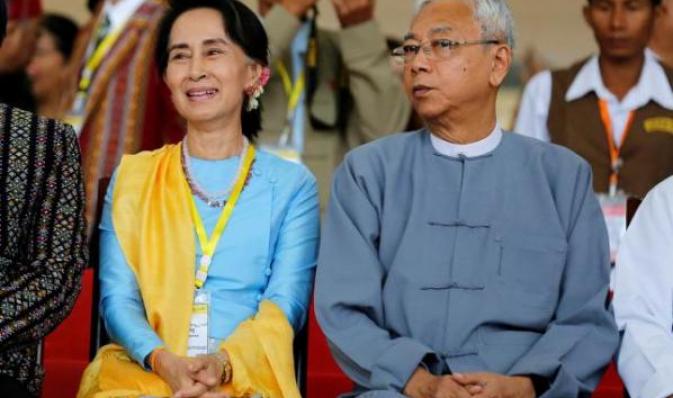
By Maung Zarni, Published by Prothom Alo on March 25, 2018
Under the façade of military-patronised electoral politics, the institution of presidency is always going to be little more than the political theatrics of Burmese marionette.
In the 1960’s and 70’s, I grew up watching traditional puppet shows on the streets of Mandalay, our cultural heartland. And I know a puppet show when I see one, day or night, in theatre or by the roadside. We kids giggled, broke into laughter, got fear-struck or teary, as the stringed lifeless wooden creatures on stage moved, in front of the half-drawn curtains, moving correspondingly with the Masters’ hand movements to the tune of traditional music interspersed with electronically amplified narration coming out of a pair of loudspeakers.
Despite my deep “pessimism of the intellect”, a tiny part of me, as being Burmese born and raised in Burma under the textbook military rule of the late General Ne Win, expressed my “optimism of the heart”, as the famous Italian labour organiser Gramsci put it. When U Htin Kyaw - U or Mr is the Burmese male honorific - was sworn in as President in Aung San Suu Kyi’s newly elected government in March 2016, I wrote in The Guardian: “Htin Kyaw’s assumption of the presidency is a symbolically important moment for the Burmese public, who have repeatedly expressed their desire to rid the country of their military overlords. For the first time in 53 years, 51 million Burmese people have got a genuine civilian president who is not a general or ex-general in civilian clothing, and who can be expected not to promote the military’s interests.”
In the last eight years, a lot of media ink, digital or literal, has been wasted on Myanmar’s “democratic transition” and a new era of “reforms”. To my deep dismay, the majority of country “experts” and international journalists have been reading the political tealeaf of my country’s affairs, as if knowing the nuances, intricacies and intrigues of semi-feudal leadership circles were going to shed brighter light on the role of Presidency and how it might mature into an autonomous, progressive force for good.
By all accounts, U Htin Kyaw, a son of the late U Wun, the Oxford-educated leading literary figure and professor of Burmese literature at Rangoon University, is a really decent human being, who has been nothing but a very loyal aide to Myanmar State Counsellor Aung San Suu Kyi. Like his late father who supported Suu Kyi and, contested and won a parliamentary seat on NLD’s ticket in 1990 elections whose results were annulled by the then ruling junta, the State Law and Restoration Council, Htin Kyaw was known for his unwavering loyalty to the woman whom the publicly referred to as “Mother”. Mother Suu picked him because she knew him to be completely pliant and pliable aide.
But loyalty to Suu Kyi alone would not have been enough: he needed to have been deemed acceptable to the Commander-in-Chief Senior General Min Aung Hlaing, under the Constitution of 2008, which was written by the previous military leadership of the aging, but not wholly retired despot Than Shwe. The Constitution was of, for and by the military put in place, through a rigged referendum in the midst of 140,000 deaths from the Cyclone Nargis in 2008, in order to specifically protect the military’s interests, and those of all generals. As such, whatever the popular mandate, or whoever occupies the Presidency, the military retains the final word on matters of national importance. Even in the case of ex-General Thein Sein who was commanded by his boss, Senior General Than Shwe to play president when the army’s mass proxy Union Solidarity and Development Party won the military-sponsored 2010 elections, Thein Sein’s moves were closely watched although the generals and ex-generals all sing from the same anti-civilian hymn book.
Barred constitutionally from assuming the Presidency after her party’s landside win over the military’s UDSP, Suu Kyi picked U Htin Kyaw to play President for her, she knew Htin Kyaw would not be perceived as a threat to the generals and the military as an institution. After all, he is a son-in-law of the late Colonel Maung Lwin, who was General Ne Win’s finance minister and deputy-prime minister. While the well-respected father stood by Suu Kyi when she was under house arrest, Htin Kyaw’s sibling s were involved as business partners in tourism investment with the military families, particularly Ne Win’s.
The military’s approval or not, Htin Kyaw’s Presidency was going to be anything but a double-puppetry. Suu Kyi had declared herself to “above-the-president” even before the elections in November 2015. The president was indeed backseat-driven by Suu Kyi, but she has no choice but observe the military’s do’s and don’ts, when it comes to matters which the military deems of national security importance, such as the genocidal expulsion of the Rohingya on the false pretext of “anti-terrorism”.
If I am to hazard a guess, the British-educated Htin Kyaw with a smart First Lady, must know that as the official man in Myanmar’s highest office he too be held accountable for the crimes against humanity and genocide in Rakhine, when the “above-the-president” herself is officially deemed an ICC-material by UN Special Rapporteur Yanghee Lee and being subjected to attempts for prosecution during her 4-day stay in Australia.
Who in their right mind would play president or above-the-president in Myanmar? There is neither power nor prestige in presidency or the parliament, as long as the military keeps itself above the law, Buddha Dharma and above all, presidency.









